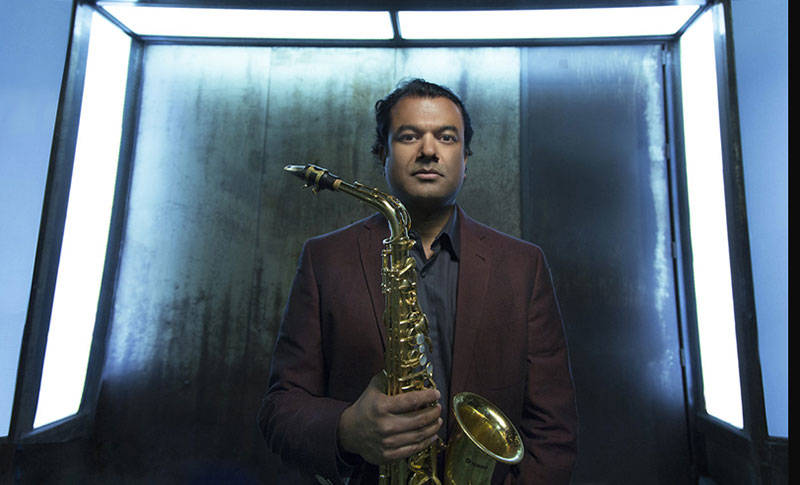While the album has been widely noted for its connection to Parker, it’s hardly what one would call a tribute album. Instead of curating a collection of Parker tunes to revisit, Mahanthappa chose instead to snag melodic bits and pieces from Parker songs and integrate them into his own compositions. It’s an approach similar to that of a hip-hop producer, sampling a song segment as a foundation on which to build, although Mahanthappa notes the references sometimes go unnoticed unless pointed out.
“I would rather people not be so concerned with the source, but just trust that’s what’s at play,” he says. “For me to do an album of Charlie Parker tunes, that would not be really giving Charlie Parker’s legacy its due, as far as I’m concerned. The best way we pay tribute to anybody is to show what we’ve learned [from them].”
That sentiment resonated with San Jose Jazz Executive Director Brendan Rawson, who admits the organization has tried repeatedly and unsuccessfully to bring the busy saxophonist to the South Bay. He was overjoyed when the dates finally lined up, especially in time to kick off a new slate of fall concerts.
“It made a lot of sense as a keystone for this series,” notes Rawson, in reference to Mahanthappa’s upcoming set. “I see him as one of those leading-edge jazz artists [who’s] always continuing to push.”
Throughout his career, Mahanthappa has chosen to focus on crafting original work rather than integrating standards into his repertoire — though the latter, he says, is something many jazz fans feel is integral to engaging with the tradition. He says the stance has led to some of his work flying under the jazz radar; he still questions whether or not he’s been fully accepted by the jazz community.
He’s also encountered similar issues navigating the jazz world as an Indian American, a path that, when he was studying as a young man, offered no blueprint for success. He recalls his early struggles performing with close friend Vijay Iyer, a pianist and fellow Indian-American who’s received similar accolades for his jazz work in recent years. In early interviews, journalists would often ask the pair if they indeed made music full-time.
He’s quick to note, however, that “over the last seven or eight years, we’re more thought of as being part of the larger jazz community.” Most recently, that acceptance has led him to Princeton University, where this fall he began his first term as the school’s Director of Jazz.
“I would like to think that we’ve made it a viable option for a lot of people to pursue what had been considered non-traditional career paths for Indian Americans,” he says, “to get outside of being doctors and computer scientists and these things we’re stereotyped as doing.”
In addition to Mahanthappa, San Jose Jazz’s Fall Concert series will feature Mariachi Flor de Toloache, a New York-based, all-female mariachi group, and Pakistan-born, Los Angeles-raised guitarist Rez Abbasi. Asked if presenting such culturally diverse programming was an intentional move to target the diverse demographics of the South Bay, Rawson chalked the pairings to coincidence: “I’m not so sure it’s as much wanting to program to these different communities as it is a reflection of where a lot of exciting music is at.”
Referring to Mahanthappa and Abbasi specifically, Rawson notes the two are “American artists who have this connection to the musical heritage of their parents, but they were brought up in the American jazz education realm. They’re approaching their music from that vantage point.”
We may still be referring to the work of artists like Mahanthappa and Abbasi with their cultural ancestry as a focal point since such voices are new to the jazz tradition, but as Rawson points out, they’re both children of America. Despite what many assume, Mahanthappa was exposed very little to Indian music growing up. Back then, he was listening to Winelight by Grover Washington Jr. and Voyeur by David Sanborn. He still boasts that he knows every Men at Work and Supertramp sax solo.
“That ‘hyphen-American’ identity is still pretty young in this country, and jazz being such a viable way to communicate that is very valuable,” concludes Mahanthappa. “Any way that I can help push that along is great.”

Rudresh Manthappa performs Sunday, Oct. 16, 2016 at Cafe Stritch in downtown San Jose. Tickets and more info at Sanjosejazz.org.



